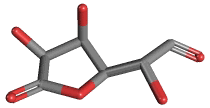|
GLUCURONOLACTONE |
| Synonyms. Glucuronolactone; D-Glucofuranuronic acid gamma-lactone; D-Glucuronic acid lactone; D-Glucurono-3,6-lactone; D-Glucurono-6,3-lactone; D-Glucuronolactone; Dicurone; gamma-Glukurolakton; Glucoxy; Glucurolactona; Glucurolactone; Glucurolactonum; Glucuron; Glucurone; Glucuronic acid lactone; Glucurono-6,3-lactone; (2R)-2-[(2S,3R,4S)-3,4-Dihydroxy-5-oxooxolan-2-yl]-2-hydroxyacetaldehyde; |
|
|
| PRODUCT IDENTIFICATION | |
|
CAS RN |
32449-92-6 |
|
EINECS RN |
251-053-3 |
|
FORMULA |
C6H8O6 |
|
MOLE WEIGHT |
176.12 |
|
H.S CODE |
2932.20.5050 |
|
SMILES |
O=C1O[C@@H]([C@@H](O)[C@@H]1O)[C@@H](O)C=O |
|
CLASSIFICATION |
Carbohydrate, Monosaccharide |
|
EXTRA NOTES |
Glucuronolactone is a naturally occurring chemical that is an important structural component of nearly all connective tissues. Glucuronolactone is also found in many plant gums.[wikipedia] |
|
|
| PHYSICAL AND CHEMICAL PROPERTIES | |
|
PHYSICAL STATE. |
white crystalline powder |
|
MELTING POINT |
172 ~ 175 C |
|
BOILING POINT |
|
|
DENSITY |
1.76 |
|
SOLUBILITY IN WATER |
26.9 g/100ml |
| SOLVENT SOLUBILITY |
|
|
VAPOR DENSITY |
|
|
log P(octanol-water) |
-2.6 |
|
VAPOR PRESSURE |
|
|
AUTOIGNITION TEMP |
|
| pK |
|
|
REFRACTIVE INDEX |
|
|
FLASH POINT |
|
|
|
| STABILITY AND REACTIVITY | |
| STABILITY | Stable under normal conditions. |
|
INCOMPATIBLE MATERIALS |
Strong oxidizing agents |
| POLYMERIZATION |
Has not been reported |
|
NFPA RATINGS |
Health: 0, Flammability: 0, Reactivity: 0 |
|
|
| EXTERNAL LINKS & GENERAL DESCRIPTION |
|
USA.gov - Glucuronolactone Wikipedia Linking - Glucuronolactone Google Scholar Search - Glucuronolactone U.S. National Library of Medicine - Glucuronolactone PubChem Compound Summary - Glucuronolactone KEGG (Kyoto Encyclopedia of Genes and Genomes) - Glucuronolactone http://www.ebi.ac.uk/chebi/ - Glucuronolactone http://www.ncbi.nlm.nih.gov/ - Glucuronolactone EPA - Substance Registry Services - Glucuronolactone |
|
|
| SALES SPECIFICATION | |
|
APPEARANCE |
white crystalline powder |
|
ASSAY |
99% min |
|
MELTING POINT |
172 ~ 175 C |
| OPTICAL ROTATION |
+16.5° ~ +20.5° (c=10, water) |
|
LOSS ON DRYING |
1% max |
|
HEAVY METALS |
10ppm max |
|
|
| TRANSPORT & REGULATORY INFORMATION | |
|
UN NO. |
|
| HAZARD CLASS |
|
| PACKING GROUP | |
|
|
| SAFETY INFORMATION | |
|
HAZARD OVERVIEW |
GHS (Globally Harmonised System) Classification: Not a dangerous substance. Potential Health Effects: Eyes - May cause eye irritation. Skin - May be harmful if absorbed through skin May cause skin irritation. Inhalation - May be harmful if inhaled. May cause respiratory tract irritation. Ingestion - May be harmful if swallowed. |
| HAZARD CODES |
|
|
RISK PHRASES |
|
|
SAFETY PHRASES |
|
|
|
| PACKING |
|
Preserved in light-resistant and well-closed bottles |
|
|
